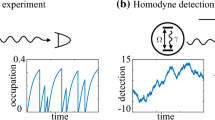Abstract:
We present a scheme for stochastic quantum-state diffusion (QSD) with adaptive noise to calculate the time evolution of an arbitrary observable of an open system. The method is based on the fact that the observable is much less sensitive to adaptive noise than to noise with a random phase. Hence, the individual realisations of the expectation value of the observable stay closer to the average evolution and fewer realisations are required to obtain the ensemble average. This is illustrated by applying QSD to a driven two-level system using both randomly phased and adaptive noise. Applying QSD with adaptive noise to an undriven two-level system enables us to derive a deterministic Schrödinger equation that produces the exact evolution of an arbitrary observable.
Similar content being viewed by others
Author information
Authors and Affiliations
Additional information
Received: 31 July 1997 / Received in final form: 12 February 1998 / Accepted: 13 March 1998
Rights and permissions
About this article
Cite this article
van Dorsselaer, F., Nienhuis, G. Quantum-state diffusion with adaptive noise. Eur. Phys. J. D 2, 175–180 (1998). https://doi.org/10.1007/s100530050127
Issue Date:
DOI: https://doi.org/10.1007/s100530050127




